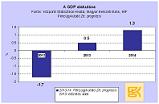| Contact |  |
 |
You are here
Home ›Ownership structure and corporate governance in the large enterprise sector in Hungary
How typical is the organisation of a network of "managerial capitalism" and ?recombinant property? in the large enterprise sector in Hungary? Based on the ownership structures and corporate governance methods of the top one hundred companies, the article argues that both models may be justified within a narrow sphere or in a particular sense. In a formal and legal sense the management is only a shareholder in exceptional instances, and its informal influence depends on the ownership type. Its power is determinative in the case of divided ownership and for some corporations owned by the state. The concept of inter-corporate ownership elaborated by David Stark is characteristic in the sense that the majority of the large enterprises are linked to a network, though these are mainly subsidiaries of multinational companies. This, however, is not a uniquely Hungarian or post socialist solution. There is a fundamental difference between Hungarian and foreign enterprises as owners at almost all levels of corporate management. It is not advisable, therefore, to treat the two groups as a single category within the conceptual framework of the "network".
Közgazdasági Szemle (Economic Review) July-August 2000, pp. 549-564
| Attachment | Size |
|---|---|
| 190.63 KB |
Financial Research Plc.
IKU Innovation Research Centre
News and events
Working Paper Series
-
11/26/2011 - 15:38
-
11/25/2011 - 16:00
-
11/18/2011 - 20:00
-
08/20/2011 - 15:31
-
07/18/2011 - 19:53



